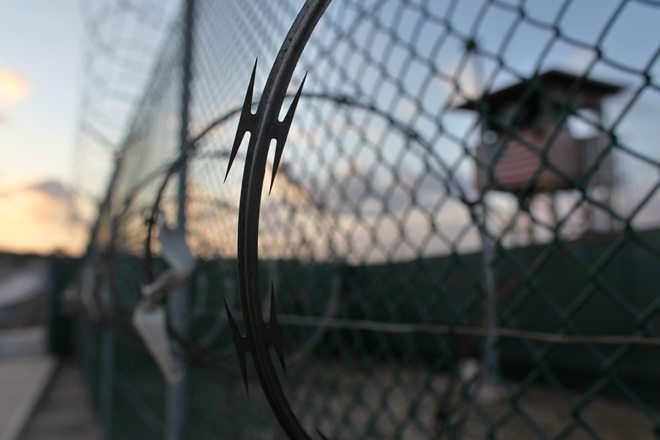MIAMI (AP) — A U.S. federal judge ruled Monday that she lacks the authority to halt the force-feeding of prisoners on hunger strike at Guantanamo Bay, while pointedly noting that the practice appears to violate international law and that President Barack Obama can resolve the issue.
District Judge Gladys Kessler said previous rulings already established that the court lacks jurisdiction to stop the force-feeding of prisoners during the ongoing protest, rejecting a motion for a preliminary injunction sought by a Syrian held at the U.S. base in Cuba.
Kessler faulted the military’s response to the hunger strike, noting a consensus of opinion that the use of a nasogastric tube to feed the men against their will is a violation of medical ethics as well as international prohibitions against inhumane treatment.
“It is perfectly clear from the statements of detainees, as well as the statements from the organizations just cited, that force-feeding is a painful, humiliating and degrading process,” she wrote.
The judge wrote “there is an individual who has does have the authority to address the issue,” and then quoted a recent speech from Obama in which he criticized the force-feeding of the prisoners at Guantanamo as he said he would renew his efforts to close the prison.
Attorneys for the prisoners were deciding whether to appeal her ruling. They are also awaiting the decision of another judge at the district court in Washington who was considering motions filed by three other prisoners.
“This is quite a statement from a federal judge,” said Jon Eisenberg, one of the attorneys who filed the motions. “She said that force feeding violates international law and medical ethics and she has called on President Obama to do something about it, which is really amazing.”
A Pentagon spokesman, Army Lt. Col. Todd Breasseale, noted that the president has also said the government would not allow prisoners at Guantanamo to harm themselves. The Department of Defense remains committed to that policy.
“We will not allow them to commit suicide,” Breasseale said. “Not with hoarded pills, not with hand-fashioned weapons, and not via self- or peer-imposed starvation.”
Lawyers for prisoners say the most recent hunger strike began in February as a protest of conditions and their indefinite confinement at the U.S. base in Cuba. The military says the hunger strike began in early March and that, as of Monday, 106 of the 166 detainees met the criteria to be declared hunger strikers, a definition that includes missing nine consecutive meals.
Prison medical officials have determined that 45 of the prisoners have lost enough weight that they can be fed liquid nutrients, by force if necessary, with a nasogastric tube to prevent them from starving themselves to death. The U.S. military intends to feed all prisoners, including those on hunger strike, before dawn and after sunset during the Muslim holy period of Ramadan to accommodate the men’s religious practices. Military officials have said the feeding process is not painful and only done to prevent any of the men from dying, not as punishment.
Copyright 2013 The Associated Press.










